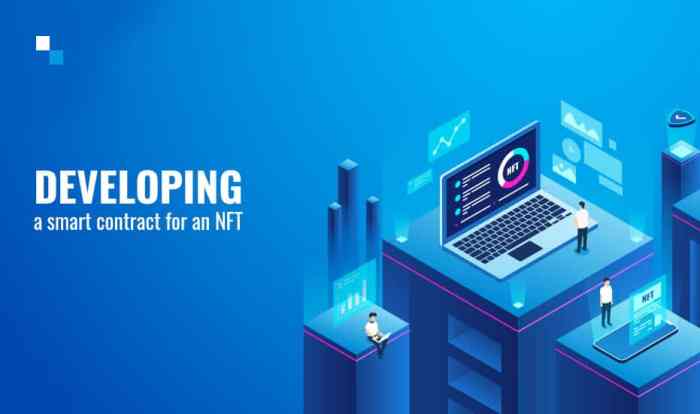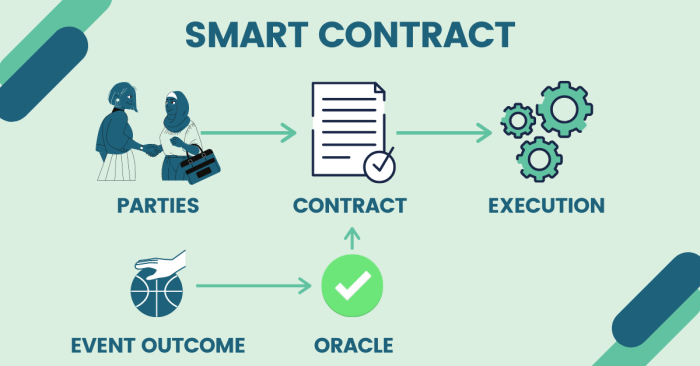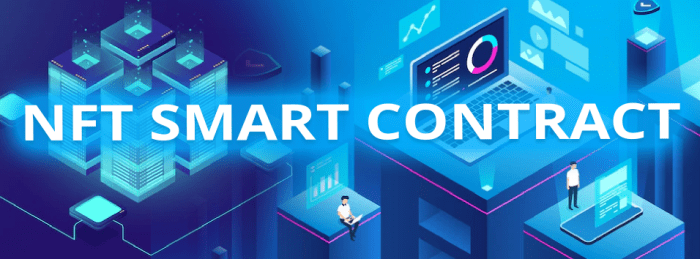Understanding smart contracts in NFTs is a crucial step towards unlocking the full potential of digital assets. Smart contracts are self-executing agreements that automate and enforce the terms of an agreement between two or more parties, making them ideal for managing the ownership, transfer, and usage of NFTs.
In this comprehensive guide, we will delve into the world of smart contracts in NFTs, exploring their benefits, challenges, and various types. We will also provide a step-by-step guide on how to create smart contracts for NFTs and discuss the legal implications and security considerations involved.
Legal Implications of Smart Contracts in NFTs: Understanding Smart Contracts In Nft

Smart contracts have emerged as a revolutionary technology in the world of NFTs, introducing new legal implications that require careful consideration. These implications encompass various aspects, including intellectual property rights, ownership, and dispute resolution.
Intellectual Property Rights
Smart contracts in NFTs play a crucial role in establishing ownership and managing intellectual property rights. The code embedded within these contracts can define the terms of use, reproduction, and distribution of the NFT, protecting the rights of creators and collectors.
Ownership
The ownership of an NFT is determined by the smart contract, which assigns ownership to a specific wallet address. This provides a secure and transparent record of ownership, reducing the risk of fraud and unauthorized transfers.
Dispute Resolution
Smart contracts can also facilitate dispute resolution in the context of NFTs. The code can include clauses that Artikel the process for resolving disputes, such as mediation or arbitration, providing a structured and efficient mechanism for addressing potential conflicts.
Future of Smart Contracts in NFTs
Smart contracts have the potential to revolutionize the NFT industry. As the technology continues to develop, we can expect to see even more innovative and groundbreaking applications of smart contracts in NFTs.One of the most promising areas for future growth is the use of smart contracts to automate the creation and management of NFTs.
This could make it easier for artists and creators to create and sell NFTs, and could also help to reduce the risk of fraud and counterfeiting.Another area where smart contracts could have a major impact is in the development of new NFT marketplaces.
Smart contracts could be used to create decentralized marketplaces that are more efficient, transparent, and secure than traditional marketplaces. This could make it easier for buyers and sellers to find and trade NFTs, and could also help to reduce the risk of fraud.Finally, smart contracts could also be used to create new types of NFTs that have never been possible before.
For example, smart contracts could be used to create NFTs that represent ownership of physical assets, such as real estate or artwork. This could open up new possibilities for the use of NFTs in a variety of industries.
Trends and Emerging Use Cases
There are a number of trends and emerging use cases for smart contracts in NFTs that are worth noting.One trend is the use of smart contracts to create NFTs that represent ownership of physical assets. This could open up new possibilities for the use of NFTs in a variety of industries, such as real estate, art, and collectibles.Another trend is the use of smart contracts to create NFTs that represent access to exclusive content or experiences.
This could be used to create new revenue streams for artists and creators, and could also provide fans with a new way to interact with their favorite artists.Finally, there is a growing trend towards the use of smart contracts to create NFTs that are interoperable across different platforms.
This could make it easier for buyers and sellers to find and trade NFTs, and could also help to reduce the risk of fraud.
Smart contracts are automated agreements stored on a blockchain that executes its terms once specific conditions are met. Understanding them is crucial for navigating the world of NFTs. Just as crucial is understanding how to effectively implement an Enterprise Resource Planning (ERP) system.
How to ERP: A Comprehensive Guide to Successful Implementation provides valuable insights into this complex process, which can enhance your understanding of smart contracts in NFTs and their potential impact on businesses.
Case Studies of Successful NFT Projects Using Smart Contracts

Smart contracts have played a pivotal role in the success of numerous NFT projects. By leveraging the capabilities of smart contracts, these projects have streamlined processes, ensured transparency, and empowered creators and collectors alike. Let’s delve into some notable case studies to explore the strategies and lessons learned.
Understanding smart contracts in NFT is crucial for businesses looking to leverage blockchain technology. These contracts automate processes, reducing costs and improving efficiency. To further enhance business operations, consider implementing an ERP system. As described in ERP System Example: The Ultimate Guide to Transforming Your Business , ERP systems streamline data management, enabling better decision-making and resource allocation.
By combining smart contracts in NFT with an ERP system, businesses can optimize processes, reduce risks, and gain a competitive edge.
CryptoPunks
- Overview:A collection of 10,000 unique pixelated characters that became a cultural phenomenon in the NFT space.
- Smart Contract Strategy:The smart contract for CryptoPunks was designed to be immutable and transparent, ensuring that the ownership and authenticity of each Punk could be easily verified.
- Lessons Learned:The success of CryptoPunks demonstrated the importance of creating a strong community around an NFT project and leveraging the power of smart contracts to guarantee authenticity and scarcity.
Art Blocks
- Overview:A platform that allows artists to create and sell generative art NFTs, where the final artwork is determined by an algorithm.
- Smart Contract Strategy:Art Blocks uses smart contracts to automate the creation, sale, and distribution of generative art NFTs, ensuring fairness and transparency throughout the process.
- Lessons Learned:Art Blocks has shown how smart contracts can empower artists by providing them with a platform to showcase their work and connect with collectors in a new and innovative way.
Axie Infinity, Understanding smart contracts in nft
- Overview:A blockchain-based game that allows players to collect, breed, and battle creatures called Axies, which are represented as NFTs.
- Smart Contract Strategy:Axie Infinity’s smart contracts govern the breeding, battling, and ownership of Axies, creating a decentralized and player-owned ecosystem.
- Lessons Learned:Axie Infinity demonstrated the potential of smart contracts to power complex game mechanics and create new economic models in the gaming industry.
NBA Top Shot
- Overview:A platform that sells officially licensed NBA highlight clips as NFTs, allowing fans to collect and trade these moments.
- Smart Contract Strategy:NBA Top Shot uses smart contracts to verify the authenticity and scarcity of each highlight clip, ensuring that collectors are purchasing genuine and unique assets.
- Lessons Learned:NBA Top Shot has shown how smart contracts can be used to create new ways for fans to engage with their favorite sports and collectibles.
Conclusion
These case studies highlight the diverse applications of smart contracts in successful NFT projects. By leveraging the capabilities of smart contracts, these projects have enhanced security, transparency, and accessibility within the NFT ecosystem. As the NFT industry continues to evolve, smart contracts will undoubtedly play an increasingly important role in shaping its future.
Tools and Resources for Smart Contract Development in NFTs
Developing smart contracts for NFTs requires specialized tools and resources. These include:
Platforms
- Ethereum: The most popular blockchain for NFT development, with a vast ecosystem of tools and resources.
- Flow: A blockchain specifically designed for NFTs, offering high throughput and low transaction fees.
- Tezos: A blockchain with a strong focus on security and formal verification, making it suitable for high-value NFT projects.
Libraries
- OpenZeppelin Contracts: A collection of audited and battle-tested smart contract libraries for Ethereum.
- ERC721: The standard interface for NFTs on Ethereum, defining the core functionality.
- ERC1155: An extension of ERC721 that allows for the creation of semi-fungible tokens (NFTs with multiple instances).
Documentation
- Ethereum Developer Documentation: Comprehensive documentation on Ethereum development, including smart contract creation.
- Flow Developer Portal: Official documentation for Flow blockchain development.
- Tezos Developer Portal: Official documentation for Tezos blockchain development.
Summary

Smart contracts are revolutionizing the NFT ecosystem, enabling creators and collectors to interact with digital assets in new and innovative ways. As the technology continues to evolve, we can expect to see even more groundbreaking applications of smart contracts in NFTs, further expanding the possibilities of this exciting new asset class.
FAQ Corner
What are the benefits of using smart contracts in NFTs?
Smart contracts in NFTs offer several benefits, including increased security, transparency, automation, and reduced transaction costs.
What are the challenges associated with using smart contracts in NFTs?
Some challenges associated with using smart contracts in NFTs include complexity, potential for errors, and legal implications.
What are the different types of smart contracts used in NFTs?
The two most common types of smart contracts used in NFTs are ERC-721 and ERC-1155.
How can I create smart contracts for NFTs?
Creating smart contracts for NFTs requires technical expertise in blockchain development. It is recommended to consult with a qualified developer for assistance.
What are the legal implications of using smart contracts in NFTs?
The legal implications of using smart contracts in NFTs are still evolving. It is important to consult with a legal professional to understand the specific laws and regulations applicable to your jurisdiction.





